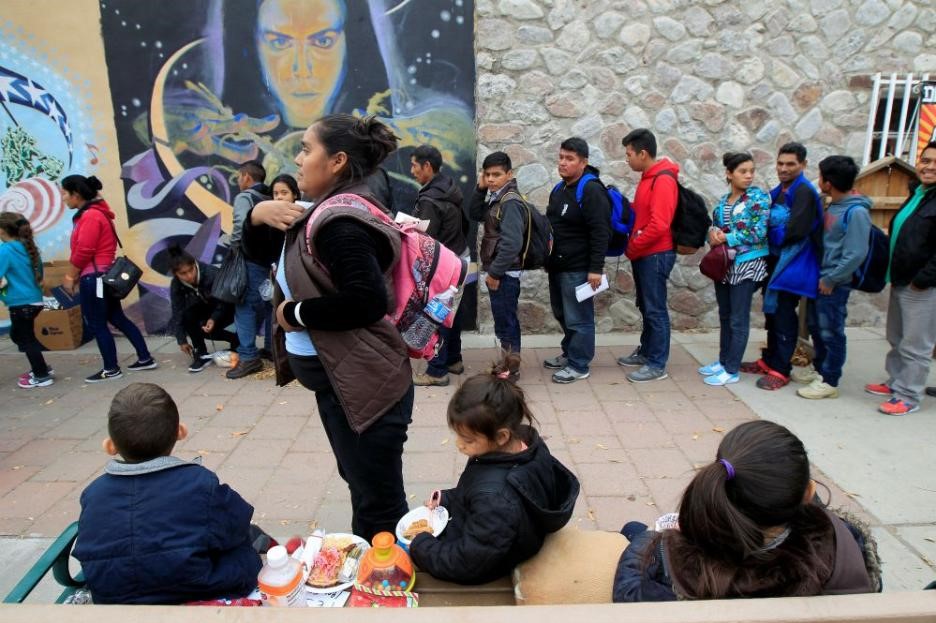
Central American migrants who were dropped off at a bus station in El Paso, Texas, line up for food Dec. 25, 2018, as they wait for transportation to emergency shelters. (CNS/Reuters/Jose Luis Gonzalez)
Think of how you prepare for Christmas. Consider, alone or with a partner:
- What kind of special things happen around your home in terms of decorations, food or music? Do you prepare for houseguests or get ready to travel yourself?
- How do your personal habits change? Are you more generous, more festive, more sentimental, more spiritual, or simply more well-behaved?
Christmas celebrates the birth of a child known both as Jesus and Emmanuel, which means "God is with us." Consider how the author experiences Emmanuel among those she encounters.
Entertaining angels on the border
Do not forget to show hospitality to strangers, for by doing so people have entertained angels unawares.
— Hebrews 13:2
Spending time on the U.S.-Mexican border in Texas working with those seeking asylum during the Advent season was, perhaps, one of the best preparations for Christmas. In the eyes of the men, women and children seeking shelter, I could see so clearly the face of Jesus, whose parents also were seeking a place of refuge.
Hundreds of parents pouring into shelters daily, fleeing hunger and violence, seek only a place to raise their children in peace — a place where there is enough food to eat and opportunities to learn. They have walked for days and months, sacrificed everything they have ever known out of love for their children, only to end up crammed into detention centers, sleeping on the floor.
Their stories tear at your heart. I found myself continually asking, "How can we treat people like this? How can we call ourselves Christians and yet deny others basic human rights?" I don't have any answers because I do not understand. I keep wondering whether it would make a difference if others really knew their stories. For that reason, I feel compelled to share just a few of the stories shared with me:
- Fernanda is 22 and has an infant. She fled from Honduras after watching her 23-year-old husband killed in front of her with threats that she would be next.
- Katerina left Guatemala with three children to protect them from the violence all around her. She knew that if she did not leave, her young sons would be forced to become gang members or be killed. She told me that when she was in Guatemala, she dreamt of coming to the United States, but now that she is here, she thinks only of her homeland. "I want to go back," she said, "but know that now it is not safe; but someday, I hope I can take my children and go home."
- Guadalupe traveled months from her native Guatemala with a 5-year-old, a 2-year-old and a 7-month-old in order to escape violence and provide a better future for her children. It was difficult to communicate with Guadalupe because she spoke so little Spanish. Her first language is Mam, one of more than 20 indigenous languages in her country.
These, and so many others, are not coming because they want to leave their homelands, but because they do not see any other way of protecting their families. All of them are asylum seekers and are being released from detention centers to reunite with family or friends in the United States while their cases are pending.
On good days, border patrol officials contact the centers that welcome the people so that they can prepare for their arrival. The migrants come with nothing but the clothes on their back and an address and phone number of someone willing to pay for a bus or plane ticket to their destination. On other days, Border Patrol simply drops hundreds of people off at the bus station without notifying the centers. This creates situations of utter chaos and overwhelms people already traumatized.
The centers are staffed mostly by lay and religious volunteers who have come from all over the country to help. Religious sisters from many congregations have responded generously. They arrive almost daily to offer their services. At one center I worked with sisters from six different congregations, coming from Pennsylvania, Iowa, South Dakota, Ohio, New York and California.
Those who speak Spanish interview people to determine what their needs are and where they are going. Others call the families or friends who will provide the bus or plane tickets. Those who do not speak Spanish are also essential, as meals need to be prepared, donated clothes need to be sorted, "to-go" bags containing sandwiches, drinks and snacks need to be prepared, and transportation must be arranged to the airport and bus station.
Despite months of travel and days and weeks in detention centers, the people I met offered nothing but smiles and gratitude for the little we could do for them. They readily volunteered to sweep and mop floors, cut up veggies for soups, do the dishes and any other task needed. As they left for the next part of their journey, they hugged the volunteers and thanked them for their help. There was no bitterness or anger, just gratitude. I asked myself many times over if I could respond with smiles and thanks if I had endured what they had.
As I continue to reflect on the coming of Jesus through the Christmas season, I keep seeing the faces of those I had encountered: Johanna, Edgar, Felix, Jaime, Elena, Amanda and so many more. Jesus' parents, too, sought shelter and safety. I pray daily that each of them has reached their destination safely.
"Do not forget to show hospitality to strangers, for by doing so people have entertained angels unawares." This quote has taken on such meaning in my life. I pray that I may continue to be open to entertaining the angels who have entered and will continue to enter my life. I pray also for the people of our country, whose attitudes and policies cause such pain and grief to so many. Jesus has come and continues to come daily. What more am I being called to do and how will we as a country respond to the Christ child among us?
Sr. Caroljean Willie isn't sure how best to help people who've crossed borders in search of a better life. Sharing their stories is one way she hopes to make a difference.
- She sees Jesus in the eyes of the asylum seekers. Describe some of the emotions she might see in their eyes.
- In what ways might the stories she shares affect those who hear them?
Mary and Joseph knew their newborn son was special. King Herod knew Jesus was a threat to his power. Matthew's gospel tells about the risk they took to protect him:
"[B]ehold, the angel of the Lord appeared to Joseph in a dream and said, 'Rise, take the child and his mother, flee to Egypt, and stay there until I tell you. Herod is going to search for the child to destroy him.'"
Joseph rose and took the child and his mother by night and departed for Egypt.
Matthew 2:12-14. Click here to read the entire story.
- By seeking refuge, Jesus' family was spared the horror of Herod's genocide. What kinds of threats do migrant families flee today?
- Consider the millions of children killed in the Holocaust and in other modern genocides. What did their loss cost their families? What gifts were lost to the world?
The bishops of the United States and Mexico collaborated nearly two decades ago on a pastoral letter that focused on immigration and the needs of migrants. They wrote:
"Faith in the presence of Christ in the migrant leads to a conversion of mind and heart, which leads to a renewed spirit of communion and to the building of structures of solidarity to accompany the migrant. Part of the process of conversion of mind and heart deals with confronting attitudes of cultural superiority, indifference, and racism; accepting migrants not as foreboding aliens, terrorists, or economic threats, but rather as persons with dignity and rights, revealing the presence of Christ."
From "Strangers No Longer," pastoral letter on migration from the bishops of the United States and Mexico, 2003
- Which of the negative attitudes mentioned by the bishops continue to taint our perspective on migrants today?
- Why is it important to be aware of Jesus' presence when we encounter migrants?
Sr. Caroljean Willie concludes by mentioning the pain and grief that American immigration policies cause. Her congregation supports the immigration reform initiatives of Network, a national Catholic social justice lobbying group inspired by sisters. Learn more here about Network's priorities and how you can support them.
Asylum seekers often cross borders with little in the way of money or possessions. Their needs continue once they reach their final destinations. Reach out to your diocesan Catholic Charities office, a local congregation of sisters or other groups that support migrants in your community. Explore what kind of help you can provide, which might include:
- Appropriate clothing for your local climate
- Healthy food, including fruits and vegetables
- Help learning the English language
- Help navigating local streets and public transportation
- Money for transportation, rent and other needs
Emmanuel, God with us,
You know the fear and doubt that compel families to take flight in hopes of safer, freer lives
Guide and protect migrant families as they navigate the roads to new homes and the complex legal paths to new starts
God, be with them and all who help them on their way.
Amen.
Tell us what you think about this resource, or give us ideas for other resources you'd like to see, by contacting us at education@globalsistersreport.org
